- Home
- Julia Quinn
Because of Miss Bridgerton
Because of Miss Bridgerton Read online
Dedication
For Susan Cotter.
You amaze me every day.
And also for Paul.
A well-timed phone call is
the mark of an excellent husband.
May you touch the sky this time.
Contents
Dedication
Chapter 1
Chapter 2
Chapter 3
Chapter 4
Chapter 5
Chapter 6
Chapter 7
Chapter 8
Chapter 9
Chapter 10
Chapter 11
Chapter 12
Chapter 13
Chapter 14
Chapter 15
Chapter 16
Chapter 17
Chapter 18
Chapter 19
Chapter 20
Chapter 21
Chapter 22
Chapter 23
Chapter 24
Epilogue
About the Author
By Julia Quinn
Copyright
About the Publisher
Chapter 1
The roof of an abandoned farmhouse
Midway between Aubrey Hall and Crake House
Kent, England
1779
It wasn’t that Billie Bridgerton was lacking in common sense. On the contrary, she was quite sure that she was one of the most sensible people of her acquaintance. But like any thoughtful individual, she occasionally chose to ignore the little voice of reason that whispered through her mind. This could not, she was certain, be considered recklessness. When she ignored this cautionary voice, it was a conscious decision, made after a (somewhat) careful analysis of her situation. And to her credit, when Billie made a decision—one that most of humanity would deem beyond foolish—she usually landed quite sprightly on her feet.
Except when she didn’t.
Like right now.
She glared down at her companion. “I ought to throttle you.”
Her companion let out a rather unconcerned meow.
Billie let out a rather unladylike growl.
The cat assessed the noise, judged it to be beneath its notice, and began to lick its paws.
Billie considered the twin standards of dignity and decorum, decided they were both overrated, and returned volley with an immature scowl.
It didn’t make her feel any better.
With a weary groan, she looked up at the sky, trying to gauge the time. The sun was wedged quite firmly behind a layer of clouds, which complicated her task, but it had to be at least four o’clock. She reckoned she’d been stuck here for an hour, and she’d left the village at two. If she factored in the time it took to walk . . .
Oh bloody hell, what did it matter what the time was? It wasn’t going to get her off this damned roof.
“This is all your fault,” she said to the cat.
Predictably, the cat ignored her.
“I don’t know what you think you were doing up in that tree,” she continued. “Any fool would have known you couldn’t have got down.”
Any fool would have left it up there, but no, Billie had heard the mewling, and she’d been halfway up the tree before it occurred to her that she didn’t even like cats.
“And I really don’t like you,” she said.
She was talking to a cat. This was what she’d been reduced to. She shifted her position, wincing as her stocking caught on one of the weatherworn roof shingles. The snag jerked her foot sideways, and her already throbbing ankle howled in protest.
Or rather her mouth howled. She couldn’t help it. It hurt.
She supposed it could have been worse. She’d been well up in the tree, easily a good eight feet above the roof of the farmhouse, when the cat had hissed at her, flung out a well-clawed paw, and sent them both tumbling.
The cat, needless to say, had made its descent with acrobatic grace, landing without injury, four paws on the roof.
Billie still wasn’t sure how she’d landed, just that her elbow hurt, her hip stung, and her jacket was torn, likely from the branch that had broken her fall two-thirds of the way down.
But the worst was her ankle and foot, which were killing her. If she were home, she’d prop it up on pillows. She’d witnessed more than her fair share of twisted ankles—some on her own body, even more on others—and she knew what to do. Cold compress, elevation, a sibling forced to wait on her hand and foot . . .
Where were her minions when she needed them?
But then, off in the distance she saw a flash of movement, and unless the local beasts had recently made the move to bipedalism, it was quite clearly human.
“Helloooooooo!” she called out, then thought the better of it and yelled, “Help!”
Unless Billie’s eyesight was deceiving her—and it wasn’t, it really wasn’t; even her best friend Mary Rokesby admitted that Billie Bridgerton’s eyes wouldn’t dare to be anything but perfect—the human in the distance was male. And there wasn’t a male of her acquaintance who could ignore a feminine cry for help.
“Help!” she yelled again, feeling no small bit of relief when the man paused. She couldn’t quite tell if he’d turned in her direction—perfect eyesight only went so far—so she let out another holler, this one quite as loud as she could make it, and nearly sobbed in relief when the gentleman—oh, please let him be a gentleman, if not by birth, then at least by nature—began to move in her direction.
Except she didn’t sob. Because she never sobbed. She would never have been that sort of a female.
She did, however, take an unexpected breath—a surprisingly loud and high-pitched unexpected breath.
“Over here!” she called out, shrugging off her jacket so that she could wave it in the air. There was no point in trying to appear dignified. She was, after all, stuck on a roof with a twisted ankle and a mangy cat.
“Sir!” she all but hollered. “Help! Please!”
The gentleman’s gait adjusted ever-so-slightly at the noise, and he looked up, and even though he was still too far away for Billie’s perfect eyes to see his face, she knew.
No. No. No. Anyone but him.
But of course it was him. Because who else would stroll by at her lowest moment, at her most awkward and embarrassing, at the one bloody time she needed rescuing?
“Good afternoon, George,” she said, once he’d drawn close enough to hear.
He put his hands on his hips and squinted up at her. “Billie Bridgerton,” he said.
She waited for him to add, “I might have known.”
He didn’t, and somehow that made her even more irritated. The world was not in balance when she couldn’t predict every inflated, pompous word that rolled out of George Rokesby’s mouth.
“Getting a bit of sun?” he inquired.
“Yes, I rather thought I could use a few more freckles,” she snapped.
He did not immediately respond. Instead he removed his tricorn hat, revealing an unpowdered head of thick, tawny brown hair, and regarded her with a steady, assessing gaze. Finally, after carefully setting his chapeau down on what had once been a stone wall, he looked back up and said, “I cannot say that I’m not enjoying this. Just a little bit.”
Any number of retorts danced on Billie’s tongue, but she reminded herself that George Rokesby was the only human being in sight, and if she wished to touch her feet to the ground before May Day she was going to have to be nice to him.
Until he rescued her, at least.
“How’d you come to be up there, anyway?” he asked.
“Cat.” Said in a voice that might charitably have been described as seething.
“Ah.”
“It was in the tree,” she explained, al
though heaven knew why. It wasn’t as if he’d requested further explanation.
“I see.”
Did he? She rather thought he didn’t.
“It was crying,” she ground out. “I couldn’t very well ignore it.”
“No, I’m sure you couldn’t,” he said, and even though his voice was perfectly cordial, she was convinced he was laughing at her.
“Some of us,” she pried her teeth apart long enough to say, “are compassionate, considerate individuals.”
He cocked his head. “Kind to small children and animals?”
“Quite.”
His right brow arched in that monstrously aggravating Rokesby manner. “Some of us,” he drawled, “are kind to large children and animals.”
She bit her tongue. First figuratively, and then literally. Be nice, she reminded herself. Even if it kills you . . .
He smiled blandly. Well, except for that little smirk at the corner.
“Are you bloody well going to help me down?” she finally burst out.
“Such language,” he scolded.
“Learned from your brothers.”
“Oh, I know,” he said. “Never could quite convince them you were actually a girl.”
Billie sat on her hands. She actually sat on her hands, she was so sure she would not be able to resist the urge to throw herself off the roof in an attempt to strangle him.
“Never could quite convince myself you were actually human,” George added, rather offhandedly.
Billie’s fingers hardened into claws. Which was really uncomfortable, all things considered. “George,” she said, and she heard a thousand different things in her tone—pleading, pain, resignation, remembrance. They had a history, they two, and no matter their differences, he was a Rokesby and she was a Bridgerton, and when push came to shove, they might as well be family.
Their homes—Crake House for the Rokesbys and Aubrey Hall for the Bridgertons—lay a mere three miles apart in this cozy green corner of Kent. The Bridgertons had been there longer—they had arrived in the early 1500s, when James Bridgerton had been made a viscount and granted land by Henry VIII—but the Rokesbys had outranked them since 1672.
A particularly enterprising Baron Rokesby (so the story went) had performed an essential service to Charles II and been named the first Earl of Manston in gratitude. The details surrounding this elevation of rank had become murky over time, but it was generally accepted that it had involved a stagecoach, a bolt of Turkish silk, and two royal mistresses.
Billie could well believe it. Charm was inherited, was it not? George Rokesby might be precisely the sort of stick-in-the-mud one would expect of the heir to an earldom, but his younger brother Andrew possessed the sort of devilish joie de vivre that would have endeared him to a notorious philanderer like Charles II. The other Rokesby brothers were not quite so roguish (although she supposed that Nicholas, at only fourteen, was still honing his skills), but they easily outstripped George in all contests involving charm and amiability.
George. They’d never liked each other. But Billie supposed she could not complain. George was the only available Rokesby at the moment. Edward was off in the colonies, wielding a sword or a pistol, or heaven only knew what, and Nicholas was at Eton, probably also wielding a sword or a pistol (although hopefully to considerably less effect). Andrew was here in Kent for the next few weeks, but he’d fractured his arm doing some such derring-do in the navy. He could hardly have been helpful.
No, it would have to be George, and she was going to have to be civil.
She smiled down at him. Well, she stretched her lips.
He sighed. Just a little. “I’ll see if there’s a ladder around back.”
“Thank you,” she said primly, but she didn’t think he heard her. He’d always had a fast, long-legged stride, and he’d disappeared around the corner before she could be properly polite.
A minute or so later he came back into view, his arm slung over a ladder that looked like it had last seen use during the Glorious Revolution. “What actually happened?” he called up, setting it into place. “It’s not like you to get stuck.”
It was as close to a compliment as she’d ever heard from his lips. “The cat was not as grateful for my assistance as one might have expected,” she said, every consonant a haughty ice pick directed at the monstrous little feline.
The ladder thunked into position, and Billie heard George climbing up.
“Is that going to hold?” she asked. The wood looked somewhat splintered and was emitting ominous creaking noises with every step.
The creaks paused for a moment. “It doesn’t really matter if it holds or not, does it?”
Billie swallowed. Another person might not be able to translate his words, but she’d known this man since the dawn of her memory, and if there was one fundamental truth to George Rokesby, it was that he was a gentleman. And he would never leave a lady in distress, no matter how fragile a ladder’s appearance.
She was in trouble, ergo he had no choice. He had to help, no matter how aggravating he found her.
And he did. Oh, she knew he did. He had never made any effort to disguise it. Although to be fair, neither had she.
His head popped into view, and his Rokesby-blue eyes narrowed. All the Rokesbys had blue eyes. Every last one of them.
“You’re wearing breeches,” George said with a heavy sigh. “Of course you’re wearing breeches.”
“I would hardly have attempted the tree in a dress.”
“No,” he said dryly, “you’re much too sensible for that.”
Billie decided to let this one pass. “It scratched me,” she said, jerking her head toward the cat.
“Did it?”
“We fell.”
George looked up. “That’s quite a distance.”
Billie followed his gaze. The nearest branch was five feet up, and she had not been on the nearest branch. “I hurt my ankle,” she admitted.
“I reckoned as much.”
She looked over at him in question.
“You would have just jumped to the ground, otherwise.”
Her mouth twisted as she peered past him to the packed dirt that surrounded the ruins of the farmhouse. At one point the building must have belonged to a prosperous farmer because it was two full stories high. “No,” she said, assessing the distance. “It’s too far for that.”
“Even for you?”
“I’m not an idiot, George.”
He did not agree with her nearly as fast as he should have done. Which was to say, not at all.
“Very well,” was what he did say. “Let’s get you down.”
She breathed in. Then out. Then said, “Thank you.”
He looked over at her with a strange expression. Disbelief, maybe, that she’d uttered the words thank and you in the same sentence?
“It’s going to be dark soon,” she said, her nose crinkling as she looked up at the sky. “It would have been awful to have been stuck—” She cleared her throat. “Thank you.”
He acknowledged this with the briefest of nods. “Can you manage the ladder?”
“I think so.” It would hurt dreadfully, but she could do it. “Yes.”
“I could carry you.”
“On the ladder?”
“On my back.”
“I’m not getting on your back.”
“It’s not where I’d want you,” he muttered.
She looked up sharply.
“Right, well,” he continued, climbing another two rungs up. The edge of the roof was now even with his hips. “Can you stand?”
She stared at him dumbly.
“I would like to see how much weight you can put on that ankle,” he explained.
“Oh,” she mumbled. “Of course.”
She probably shouldn’t have attempted it. The slant of the roof was such that she’d need both her feet for balance, and her right was near to useless by this point. But she tried, because she hated showing weakness in front of this man, or
maybe she tried just because it wasn’t in her nature not to try—anything—or maybe she just didn’t think the matter through in the first place, but she stood, and she stumbled, and she sat right back down.
But not before a choked cry of pain tore across her lips.
George was off the ladder and on the roof in a second. “You little fool,” he muttered, but there was affection in his voice, or at least as much affection as he ever showed. “May I see it?”
Grudgingly, she poked her foot in his direction. She’d already removed her shoe.
He touched it clinically, cupping her heel in one hand as he tested her range of motion with the other. “Does it hurt here?” he asked, pressing lightly on the outside of her ankle.
Billie let out a hiss of pain before she could stop herself and nodded.
He moved to another spot. “Here?”
She nodded again. “But not quite as much.”
“What about—”
A bolt of pain shot through her foot, so intense it was positively electric. Without even thinking, she yanked it back from his hands.
“I’ll take that as a yes,” he said with a frown. “But I don’t think it’s broken.”
“Of course it’s not broken,” she practically snapped. Which was a ridiculous thing to say because there was no of course about it. But George Rokesby always brought out the worst in her, and it didn’t help that her foot hurt, damn it all.
“A sprain,” George said, ignoring her little outburst.
“I know.” Petulantly. Again. She hated herself right now.
He smiled blandly. “Of course you do.”
She wanted to kill him.
“I’ll go first,” George announced. “That way if you stumble I’ll be able to stop you from falling.”
Billie nodded. It was a good plan, the only plan, really, and she’d be stupid to argue just because he was the one who’d come up with it. Even if that had been her initial impulse.
“Ready?” he asked.
She nodded again. “You’re not concerned that I’ll knock you off the ladder?”
“No.”
No explanations. Just no. As if it were absurd even to ponder the question.
She looked up sharply. He looked so solid. And strong. And dependable. He’d always been dependable, she realized. She was just usually too busy being irritated by him to notice.

 Just Like Heaven
Just Like Heaven B03.2 An Offer from a Gentleman Ep II
B03.2 An Offer from a Gentleman Ep II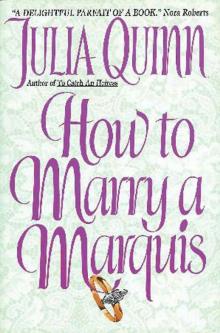 How to Marry a Marquis
How to Marry a Marquis When He Was Wicked: The 2nd Epilogue
When He Was Wicked: The 2nd Epilogue Ten Things I Love About You
Ten Things I Love About You The Viscount Who Loved Me
The Viscount Who Loved Me The Duke and I
The Duke and I B05.2 To Sir Philip With Love Ep II
B05.2 To Sir Philip With Love Ep II An Offer From a Gentleman: The 2nd Epilogue
An Offer From a Gentleman: The 2nd Epilogue Minx
Minx On the Way to the Wedding with 2nd Epilogue
On the Way to the Wedding with 2nd Epilogue Mr. Cavendish, I Presume
Mr. Cavendish, I Presume A Night Like This
A Night Like This Splendid
Splendid Everything and the Moon
Everything and the Moon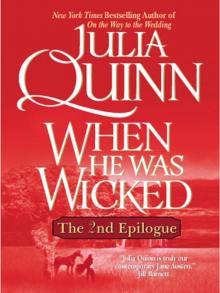 When He Was Wicked
When He Was Wicked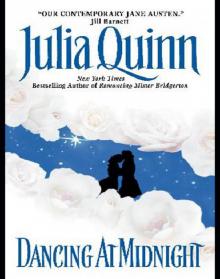 Dancing at Midnight
Dancing at Midnight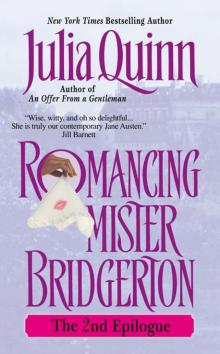 Bridgerton 04: 2nd Epilogue - Romancing Mister Bridgerton
Bridgerton 04: 2nd Epilogue - Romancing Mister Bridgerton The Lost Duke of Wyndham
The Lost Duke of Wyndham To Sir Phillip, With Love
To Sir Phillip, With Love It's in His Kiss
It's in His Kiss The Other Miss Bridgerton
The Other Miss Bridgerton Bridgerton 02: 2nd Epilogue - The Viscount Who Loved Me
Bridgerton 02: 2nd Epilogue - The Viscount Who Loved Me The Secrets of Sir Richard Kenworthy
The Secrets of Sir Richard Kenworthy On the Way to the Wedding
On the Way to the Wedding The Secret Diaries of Miss Miranda Cheever
The Secret Diaries of Miss Miranda Cheever Because of Miss Bridgerton
Because of Miss Bridgerton What Happens in London
What Happens in London JQuinn - The Secret Diaries of Miss Miranda Cheever
JQuinn - The Secret Diaries of Miss Miranda Cheever The Girl With the Make-Believe Husband
The Girl With the Make-Believe Husband First Comes Scandal
First Comes Scandal To Catch an Heiress
To Catch an Heiress The Sum of All Kisses
The Sum of All Kisses An Offer From a Gentleman
An Offer From a Gentleman The Bridgertons: Happily Ever After
The Bridgertons: Happily Ever After Bridgerton Collection Volume 1 (Bridgertons)
Bridgerton Collection Volume 1 (Bridgertons)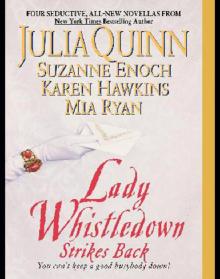 Lady Whistledown Strikes Back
Lady Whistledown Strikes Back Secret Diaries of Miss Miranda Cheever
Secret Diaries of Miss Miranda Cheever An Offer from a Gentleman with 2nd Epilogue
An Offer from a Gentleman with 2nd Epilogue Four Weddings and a Sixpence
Four Weddings and a Sixpence An Offer from a Gentleman: The Epilogue II
An Offer from a Gentleman: The Epilogue II The Further Observations of Lady Whistledown
The Further Observations of Lady Whistledown The Viscount Who Loved Me: The Epilogue II
The Viscount Who Loved Me: The Epilogue II It’s In His Kiss Epilogue II
It’s In His Kiss Epilogue II To Sir Phillip, with Love: The Epilogue II
To Sir Phillip, with Love: The Epilogue II The Secret Diaries of Miss Miranda Cheevers
The Secret Diaries of Miss Miranda Cheevers A Night Like This (Smythe-Smith Quartet)
A Night Like This (Smythe-Smith Quartet) The Lady Most Likely...
The Lady Most Likely... Bridgerton 06: 2nd Epilogue - When He Was Wicked
Bridgerton 06: 2nd Epilogue - When He Was Wicked Just Like Heaven sq-1
Just Like Heaven sq-1 Gretna Greene
Gretna Greene